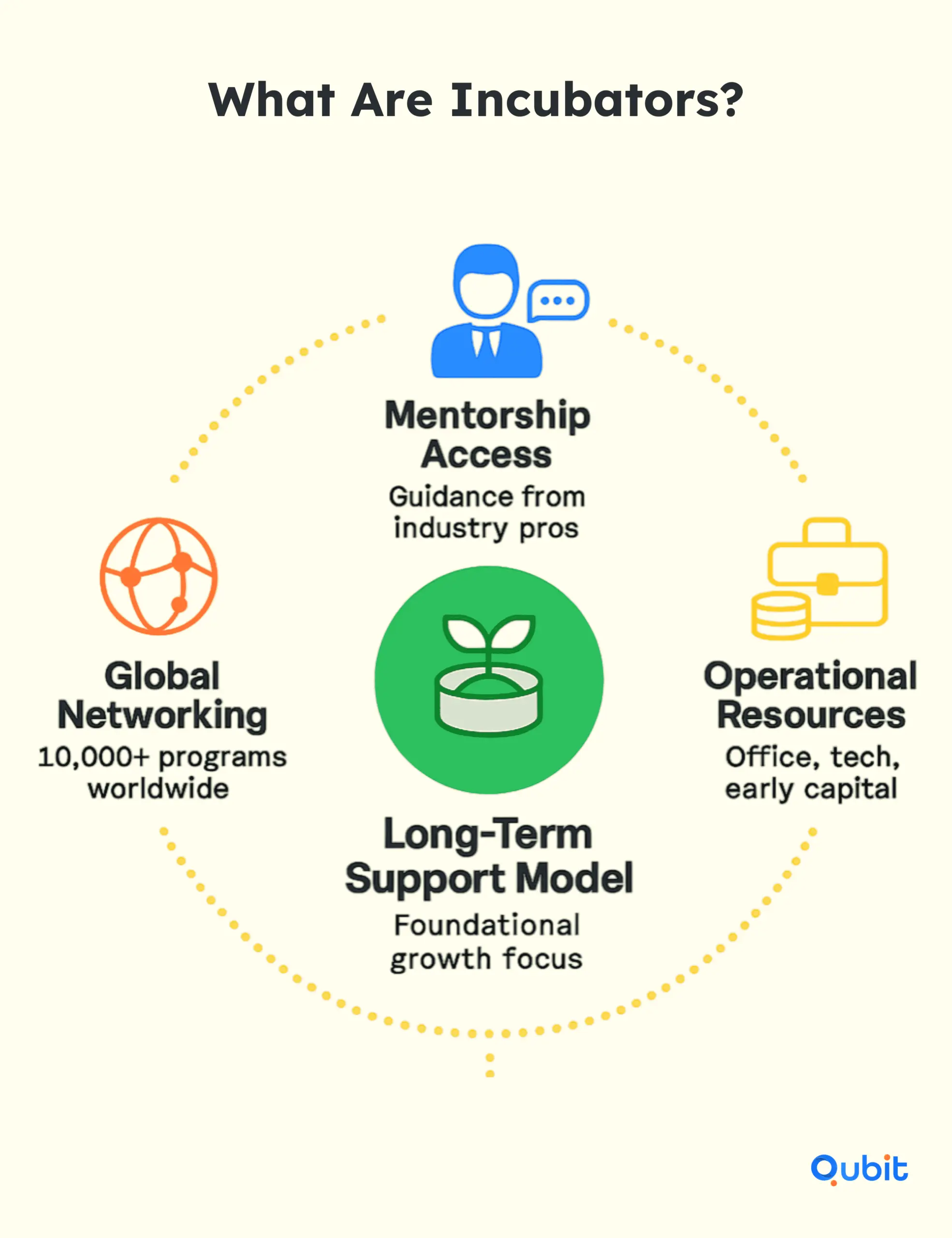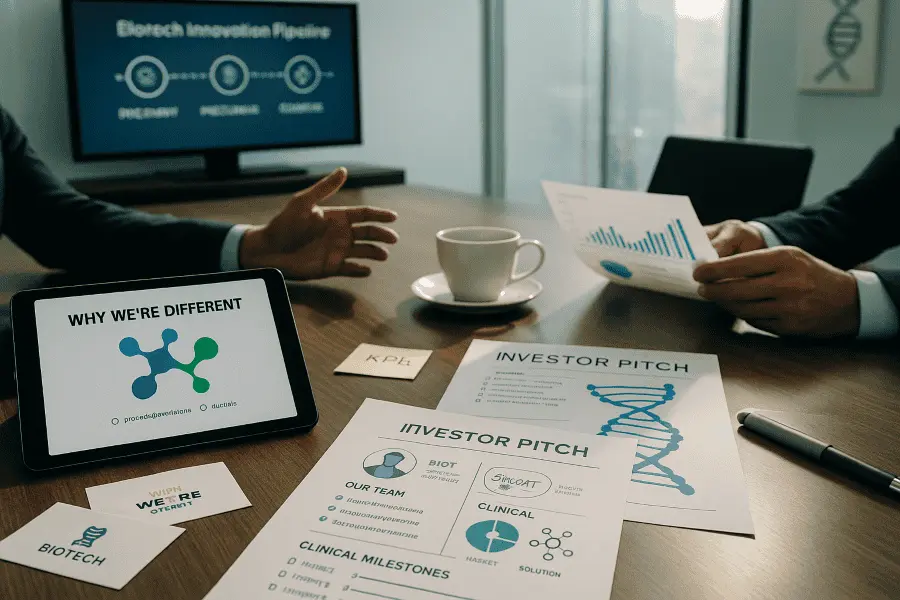With biotech funding reaching billions annually, the stakes are high, and aligning with investors who understand your vision can make all the difference. This article explores actionable strategies to help biotech entrepreneurs identify and attract investors who not only provide capital but also bring valuable expertise and connections.
A focused review of biotech VC firms complements your exploration by detailing specific venture capital players active in the biotech sector.
Let’s jump right in!
Proactive Financial Strategy & Timely Decision Making
The biotech funding landscape has shifted dramatically, with investment cooling compared to previous years. For emerging biotech start-ups, this cautious environment demands a proactive approach to financial planning. Strategic decisions made during the early stages of development can significantly influence long-term market readiness and the ability to attract investors.
Early Financial Strategy: A Necessity, Not an Option
Biotech start-ups must prioritize financial strategy from the outset. The record-breaking $34 billion in venture capital investment seen in 2021 highlighted the sector’s peak, but recent trends indicate a more measured pace. According to the JPMorgan Biopharma Insights, biopharma venture investment totaled $26.0 billion across 416 rounds in 2024, reflecting sustained interest but with greater scrutiny from investors.
This shift underscores the importance of aligning early-stage financial decisions with investor expectations. Caution-minded investors are more likely to support start-ups that demonstrate a clear understanding of funding priorities, operational efficiency, and market positioning.
Long-Term Impact of Early Decisions
The decisions made during the initial phases of a biotech start-up’s journey ripple through its entire trajectory. Poor financial planning can lead to delays in product development, missed market opportunities, or difficulty securing follow-on funding. Conversely, a well-thought-out strategy positions the company for sustainable growth and enhances its appeal to investors.
For example, focusing on cost-effective research and development, building a robust intellectual property portfolio, and maintaining transparency in financial reporting can set the foundation for future success. These elements not only improve market readiness but also foster trust among stakeholders.
To dive deeper into actionable strategies for securing funding, explore our comprehensive guide on biotech startup fundraising strategies, which offers a detailed framework for navigating this complex process.
By making informed, strategic decisions early on, biotech start-ups can adapt to the evolving funding landscape and position themselves for long-term success.
Strategic Long-Term Planning for Sustainable Growth
Early planning is the cornerstone of sustainable growth for startups, especially in industries like biotech where scientific hurdles often intersect with business challenges. Founders must prioritize developing an exit strategy early in their journey to ensure alignment with their long-term goals. This approach not only provides clarity but also positions the company to adapt to evolving market dynamics.
The importance of balancing scientific innovation with robust business planning cannot be overstated. While breakthroughs in research are critical, they must be paired with strategies that appeal to both venture capitalists and corporate investors. For instance, Global CVC-backed funding reached $65.9B in 2024 with a 20% YoY increase, as highlighted by CB Insights Research. This underscores the growing influence of corporate venture capital
Additionally, the fluctuating IPO landscape serves as a reminder of the importance of timing and preparation. In the first half of 2022, only 23 biotechs went public globally compared to 68 during the same period in 2021. This stark contrast highlights the need for startups to remain agile and consider alternative exit routes, such as acquisitions or partnerships, when public offerings become less viable.
For biotech founders seeking early-stage funding alternatives, a detailed overview within the biotech angel investors list enriches your understanding of tailored funding options. This resource provides valuable insights into angel investors and seed funds specializing in biotech startups, helping founders navigate the initial phases of their journey effectively.
Strategic planning is not just about anticipating challenges; it’s about creating opportunities for sustainable growth. By integrating scientific innovation with business foresight, startups can position themselves for success in an increasingly competitive landscape.
Investor Selection and Engagement
Securing the right investors at the right time can significantly impact a startup’s trajectory. For biotech companies, where funding needs evolve alongside scientific milestones, understanding funding phases and aligning with suitable investors is essential. Selecting the right investors is not just about capital; it’s about finding partners who align with your vision and can contribute strategically to your growth.
Understanding Funding Phases
Biotech startups typically progress through distinct funding phases, each requiring a tailored approach to investor engagement. Early-stage funding often comes from institutional support or public grants, providing the initial resources to validate concepts and generate preliminary data. These sources are critical before pursuing later-stage investments, which demand more robust evidence of commercial viability.
For example, fewer than 5% of biotech firms listed last year in the U.S. were trading above their initial price. This statistic underscores the importance of timing investor engagement to ensure the startup’s value proposition is compelling and well-supported by data.
Aligning Investor Profiles with Business Milestones
Matching investor profiles with your company’s stage of development is crucial. Early-stage investors, such as angel investors or seed funds, often focus on innovation and potential. As your startup progresses, venture capitalists and private equity firms may prioritize de-risked assets and clear commercial pathways. Highlighting robust preclinical or clinical data in your pitch can resonate with these investors, as there is a growing preference for assets with minimized risk.
A case study of a Swiss biotech startup demonstrates this principle effectively. By targeting oncology-focused venture capitalists, the company secured over $10 million in funding through a strategic outreach campaign to 1,061 qualified investors. This example illustrates how aligning investor outreach with a specific therapeutic focus can accelerate funding success.
Timing Funding Rounds
The timing of funding rounds can make or break a startup’s growth potential. Engaging investors too early may result in undervaluation, while waiting too long could lead to missed opportunities. Biotech startups must carefully assess their readiness for funding rounds, ensuring they have the necessary data and milestones to attract the right investors.
Strategic timing also involves understanding market conditions and investor sentiment. For instance, when fewer than 5% of newly listed biotech firms outperform their starting price, timing becomes critical to avoid unfavorable market dynamics.
Understanding Venture Capital Priorities
Venture capitalists often prioritize the strength and experience of a biotech start-up’s management team when evaluating investment opportunities. A proven track record of leadership and industry expertise can significantly influence their decision-making process. Founders should focus on showcasing their team’s ability to execute complex projects, adapt to challenges, and drive innovation in a highly competitive field.
Another critical factor is setting realistic financial expectations. Biotech start-ups operate in a capital-intensive industry, where developing a successful drug can cost approximately $1 billion, factoring in clinical trial failures. Overpromising on timelines or financial outcomes can erode trust and deter potential investors. Instead, founders should present transparent projections that reflect the inherent risks and long development cycles associated with drug discovery.
By aligning their pitch with venture capitalists’ priorities—strong leadership and pragmatic financial planning—biotech entrepreneurs can enhance their chances of securing funding and building long-term partnerships.
Leveraging Strategic Partnerships and Collaborations
Forming alliances with Contract Development Manufacturing Organizations (CDMOs) and Contract Research Organizations (CROs) can transform the trajectory of a startup in the biotech and pharmaceutical sectors. These partnerships provide access to specialized resources, industry expertise, and operational support that startups often lack in their early stages.
Enhancing Operational Capabilities
Collaborating with CDMOs can streamline critical processes such as drug development, manufacturing, and distribution. For instance, CDMOs offer services like cell-line development, viral vector manufacturing, and bioavailability-enhancing formulation, which are essential for startups aiming to bring innovative products to market. Additionally, these organizations can help secure earlier regulatory feedback, reducing time to market and ensuring compliance with industry standards.
On the clinical side, CROs play a pivotal role in managing trials across multiple locations and finding patients for specific indications. Their expertise in protocol compliance and trial execution not only accelerates the development timeline but also ensures the credibility of the results, making the startup more appealing to investors.
Expanding Global Reach
Strategic collaborations can also open doors to international markets. CROs, for example, have established networks that enable startups to conduct trials globally, expanding their reach and visibility. This global presence is particularly valuable for attracting investors who prioritize scalability and market potential.
Case Study: Captura BioPharma
A compelling example of the power of partnerships is Captura BioPharma’s collaboration with Grant Engine. By executing a targeted approach and leveraging strategic proposal development, the company secured $82 million in non-dilutive funding from BARDA for radiological countermeasures. This achievement underscores how well-planned collaborations can attract substantial resources and drive growth under tight deadlines.
Strategic partnerships with CDMOs and CROs are more than operational solutions—they are catalysts for growth, innovation, and investor confidence. By tapping into the expertise and networks of these organizations, startups can overcome resource limitations, accelerate development timelines, and position themselves for long-term success.
Maximizing Academic and Incubator Advantages
Early-stage biotech startups often face significant hurdles, but academic environments and incubators can provide essential support to overcome these challenges. University settings are uniquely positioned to lower entry barriers by offering access to affordable infrastructure and specialized resources. These environments foster innovation while reducing the financial strain on budding entrepreneurs.

Incubators within academic institutions amplify these benefits by delivering tailored services and connections. Joining an academic incubator can help founders stretch initial capital further while forging key industry connections. These incubators often provide low-cost office space, pre-negotiated supplier rates, procurement services, and access to investor networks. Such resources not only streamline operations but also open doors to early investor engagement, a critical factor for biotech startups seeking funding.
Moreover, the proximity to academic research facilities and experts creates a collaborative ecosystem. Startups can tap into cutting-edge research, access specialized equipment, and even collaborate with academic professionals to refine their innovations. This synergy accelerates development timelines and enhances the credibility of biotech ventures in the eyes of potential investors.
For entrepreneurs aiming to build a strong foundation for their biotech startup, academic incubators offer a strategic advantage. By combining cost-effective infrastructure with invaluable networking opportunities, these incubators pave the way for sustainable growth and innovation.
Reassessing Platform Strategies for Focused Growth
Biotech startups are experiencing a notable shift in investor priorities. Venture capitalists, once enamored with broad platform-based models, are now favoring companies that focus on developing specific therapeutic assets. This pivot reflects a growing preference for clarity in commercial potential and reduced risk profiles.
According to McKinsey, advanced platform technologies attracted two-thirds of the $52 billion invested in therapeutic-based biotechs from 2019 to 2021. However, venture capitalists are now exercising caution toward purely platform-based plays, signaling a need for startups to reassess their strategies. Companies that concentrate on assets nearing clinical milestones or commercialization are better positioned to align with investor expectations.
Strategies for a Targeted Approach
Prioritize Therapeutic Assets Over Platforms
Shifting focus from expansive R&D platforms to specific therapeutic assets can help startups demonstrate tangible progress. Investors are increasingly drawn to companies with clear paths to market, as opposed to open-ended research initiatives.Collaborate Strategically to De-Risk Development
Strategic partnerships with established biotech firms or academic institutions can mitigate risks and accelerate innovation. These collaborations not only provide access to expertise but also enhance credibility, making startups more attractive to cautious investors.Highlight Commercial Viability
Presenting a well-defined roadmap for commercialization is essential. Whether through early-stage trials or near-market assets, showcasing the potential for revenue generation can significantly boost investor confidence.
The Investor Perspective
As venture capitalists shift their focus toward companies nearing pivotal milestones, startups must adapt to remain competitive. A strategic pivot from large-scale platform approaches to narrower, near-clinical assets can align better with investor risk appetites.
This evolution in investment trends underscores the importance of clarity and focus in biotech strategies. By reassessing their approach, startups can position themselves to attract funding and drive meaningful growth.
Optimizing Regulatory Engagement for Market Approval
Regulatory meetings provide an invaluable opportunity to gather feedback on clinical and safety protocols, ensuring that development strategies align with compliance requirements. By addressing potential concerns early, start-ups can refine their processes and demonstrate a commitment to quality and safety—key factors that resonate with investors.
Operational readiness is equally essential. Collaborating with Contract Development and Manufacturing Organizations (CDMOs) can simplify the complexities of regulatory preparation. These partnerships bring specialized expertise to the table, enabling biotech companies to streamline documentation, meet submission deadlines, and avoid costly delays. CDMOs also help ensure that production standards meet regulatory expectations, further strengthening the case for approval.
For biotech start-ups, regulatory engagement is not just about compliance; it’s an opportunity to build credibility. Clear communication with regulatory bodies signals professionalism and preparedness, boosting investor confidence. When investors see a company proactively addressing regulatory hurdles, they are more likely to view it as a viable and trustworthy investment.
By prioritizing regulatory readiness and leveraging expert partnerships, biotech companies can accelerate their pathway to market approval while fostering trust among stakeholders.
Maintaining Focus on End Goals and Patient Impact
Biotech ventures often face complex challenges, but their ultimate purpose remains clear: achieving regulatory approval and improving patient health outcomes. While navigating the intricate pathways of drug development, it’s crucial to keep the focus on the end goal—delivering treatments that make a tangible difference in patients' lives.
Expert involvement plays a pivotal role in this process. From addressing technical hurdles to ensuring compliance with stringent regulations, subject-matter experts provide the specialized knowledge needed to advance development effectively. Their insights can help refine strategies, optimize processes, and anticipate potential obstacles, ensuring that each step aligns with the overarching mission of patient care.
Regulatory approval is undoubtedly a significant milestone, but it’s only part of the journey. The true measure of success lies in how well a product improves health outcomes and meets the needs of the patients it serves. By prioritizing patient impact throughout the development lifecycle, biotech ventures can create solutions that not only meet regulatory standards but also fulfill their promise of better health and well-being.
Maintaining this dual focus—on both regulatory success and patient-centered innovation—requires a commitment to collaboration and expertise. With the right team and a clear vision, biotech companies can overcome challenges and deliver meaningful advancements in healthcare.
Conclusion
Strategic planning is the cornerstone of any successful startup journey. Early financial planning, long-term strategy development, robust intellectual property management, and precise investor selection are essential elements that drive sustainable growth. Equally important is the alignment of operational, regulatory, and partnership strategies to ensure impactful outcomes for patients and stakeholders alike.
If you’re looking to turn a tight plan into investor confidence, at Qubit we understand preclinical/clinical roadmaps, IP strategy, and partner alignment. Move from strategy to term sheets with our biotech fundraising assistance and book a fast readiness review.
Key Takeaways
- Comprehensive corporate documentation and a secure data room are fundamental for investor due diligence.
- A robust business plan, validated technology, and a strong team are critical for showcasing investment potential.
- Setting a realistic pre-money valuation and aligning funding with milestones optimizes capital usage.
- Understanding diverse financing types and term sheets is essential for negotiating effective deals.
- A compelling investor pitch and strategic networking pave the way for funding success.
Frequently asked Questions
What are the best ways to find investors for a biotech startup?
Finding investors for a biotech startup involves connecting with industry-specific networks, attending biotech investment conferences, and exploring specialized investor mapping services. Crafting a pitch that addresses both scientific and financial risks can significantly improve your chances of securing funding.






